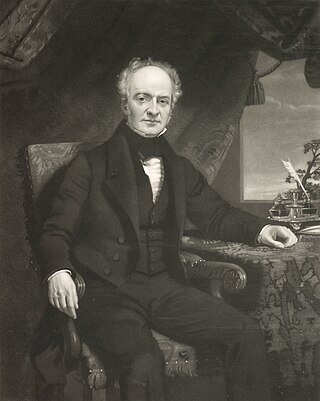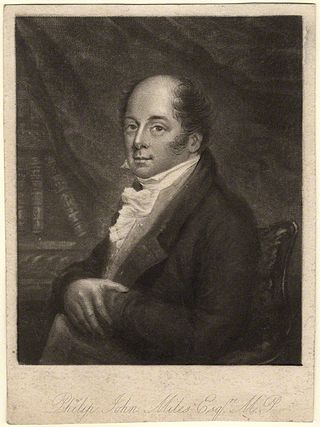Related Research Articles

Sir Manasseh Masseh Lopes, 1st Baronet, of Maristow in the parish of Tamerton Foliot, Devon, was a British Member of Parliament and borough-monger.

Charles Horsfall was a merchant and slave-owner who served as Mayor of Liverpool 1832–1833.

George Watson-Taylor, of Saul's River, Jamaica, was a plantation owner and Member of Parliament (MP) at Westminster. In 1810 he married into the family of the planter Sir John Taylor, 1st Baronet, in time adding the Taylor surname to his own, and becoming the richest planter on Jamaica. He bought a house in Cavendish Square, London, and Erlestoke Park, near Devizes, Wiltshire. As MP for a number of constituencies, where he was brought in without contests, he supported the Tory administration, and campaigned for the retention of slavery.

Philip John Miles (1773–1845) was an English landowner, slave owner, merchant, shipowner, banker and politician from Bristol. Through his banking interests he found himself on the register of owners of slaves on plantations in Jamaica though only as mortgagee in possession in cases when his bank had taken possession of plantations through the default of their owners on mortgage payments. He left an estate of over £1.2 million, making him the first recorded millionaire of Bristol.
William James was an English Radical politician. A Liverpool-born slave-owner, he sat in the House of Commons as a Member of Parliament (MP) for constituencies in Cumberland for twenty years over the three decades from 1820.
Fulke Rose was a British physician and early colonist of Jamaica. He was one of the principal buyers in Jamaica of slaves taken by the Royal African Company and had extensive land-holdings on the island. He continued to practice medicine in Jamaica and with Hans Sloane attended the former privateer Henry Morgan towards the end of Morgan's life.
Joseph Barnes was a merchant and slave-owner in Jamaica. He was elected to the House of Assembly of Jamaica in 1820.
John Blythe was the owner of the Kendal and Tweedside estates in Westmoreland Parish, Jamaica. He was elected to the House of Assembly of Jamaica in 1820.
Hamilton Brown was an Irish-born planter and politician who resided in Saint Ann Parish, Jamaica, which he represented in the House of Assembly of Jamaica for 22 years. Brown founded the settlement of Hamilton Town in Saint Ann Parish, which was named after him.
John Hanson was a planter in Jamaica and the owner of the Salt Pond Pen. He inherited this estate from his father, the planter and slave owner John Hanson. He was elected to the House of Assembly of Jamaica in 1820.
John Holmes (1763-1836) was a planter and slave-owner in Jamaica. He was elected to the House of Assembly of Jamaica in 1820.
William Lambie was a planter and slave-owner in Jamaica. He was elected to the House of Assembly of Jamaica in 1820.
John Mais (1778-1853) was a planter and slave-owner in Jamaica. He was elected to the House of Assembly of Jamaica in 1820 for the parish of Saint Andrew.
Kenneth Macpherson or McPherson was a planter and slave-owner in Jamaica. He was elected to the House of Assembly of Jamaica in 1820.
Henry Waite Plummer (1771-1847) was a planter and slave-owner in Jamaica. He was elected to the House of Assembly of Jamaica in 1820.
Peter Robertson was a planter and slave-owner in Jamaica. He owned Dunrobin Plantation, Friendship Valley Pen, Prospect pen, and the Weybridge Estate, and had interests in others. He was elected to the House of Assembly of Jamaica in 1820 for the parish of Saint Thomas-in-the-East.
William Stimpson was a planter and slave-owner in Jamaica. He owned the Java Plantation in Manchester Parish and had interests in others. He was elected to the House of Assembly of Jamaica in 1820 for the parish of Vere.
John Williams was a planter and slave-owner in Jamaica. He owned the Cool Spring Plantation in Clarendon Parish and had an interest in Provost's Rock River plantation. He had family connections to the Isle of Wight in England. He was elected to the House of Assembly of Jamaica in 1820 for the parish of Clarendon.

Charles Nicholas Pallmer was an English politician, West Indies estate owner and a supporter of slavery. He twice served as a Member of Parliament (MP), with his later career overshadowed by high debts and bankruptcy.
References
- ↑ Curtis Philip Berry. Legacies of British Slave-ownership, University College London. Retrieved 11 January 2019.
- ↑ Hakewill, James. (1825) A Picturesque Tour of the Island of Jamaica, From Drawings Made in the Years 1820 and 1821. London: Hurst and Robinson & E. Lloyd. p. 13.
- ↑ The Christian Observer, 1830, p. 227.